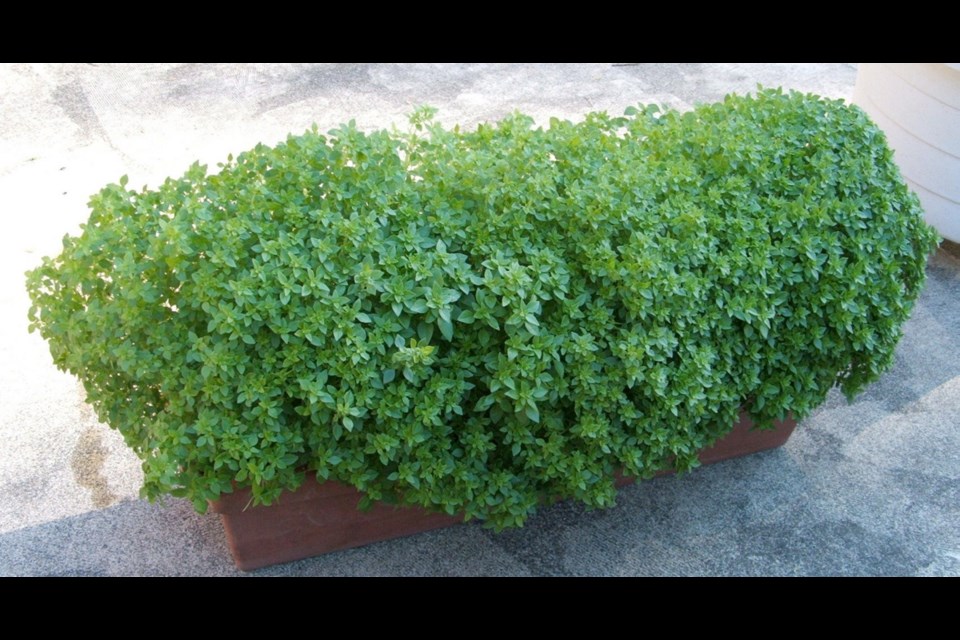Dear Helen: I’ve become convinced that I have a congenital inability to grow basil. It either fails to germinate, turns black or collapses. I’m ready to have one more go at it, if you can provide some hope of success.
B.C.
You are not alone. This question arises several times each year in my mail.
Warmth, sunlight, and a well-drained but consistently moist soil that is fertile and humus-rich are the elements that go into good basil growth. Growth tips turn black in cold conditions. Collapse can come from cold or/and wet soils.
I’ve consistently observed that basil grows well most easily in containers. I grow basil year-round, from mid-autumn through mid-spring indoors in pots and outdoors in summer on the patio in window-box type planters.
I also find the small-leaved varieties easiest to grow well. They have the same fine flavour and scent as the large-leaved ones. Some variety names are Spicy Globe, Green Globe, and Pluto. West Coast Seeds lists Piccolino, a tidy, dome-shaped Greek basil that has done well for me in patio containers. They also list Emily, a dwarf, compact Genovese basil that they recommend for containers.
The indoor seeding time I aim for is around mid-April, for transplanting into outdoor containers in May. The start-up can be later. These easy basils germinate well in warmth and develop fairly quickly.
Dear Helen: My children and I have been cooking together while they’ve been home from school. The kale plants in our garden are still producing some tender, juicy new shoots and leaves that we’d like to use before the shoots lengthen and harden into flower-bearing stems. Have you an easy way to make these last pickings into an interesting dish?
K.C.
The weather turning chilly again late last month kept kale plants producing juicy young shoots. I’ve been devouring them in salads and cooked dishes. Here’s an easy recipe that children, depending on their ages, can participate in making. It can also be made with spinach. The dish is meant to be eaten hot, but I like it even better cold.
Cheesy-eggy kale or spinach
Fry chopped onion and garlic in oil and butter. Add sliced mushrooms if you like.
Add washed, chopped kale or spinach. Cover the pot. Cook until the greens wilt.
Take the pot off the heat and let it cool a little.
Break two eggs into a bowl and beat them with a fork or whisk for a minute or so. Add salt and pepper, and around a half cup of grated Parmesan cheese.
Add the egg mixture to the greens. Pour into a buttered, mid-sized baking dish. Sprinkle with more grated cheese. Bake for 15 to 20 minutes at 375 F.
Dear Helen: Last summer I planted two young arbutus trees in outdoor pots They looked fine all winter, and bloomed in March. Now the leaves have some kind of sticky coating and many little bugs. What should I do?
B.M.
The insect pest most likely to produce copious amounts of sticky “honeydew” on arbutus are pale green aphids, which exude the sticky substance. Their feeding can cause some leaf curling. The best way to remove them is with a strong steam of water, repeated regularly until the foliage remains clean.
The flowering time you mention indicates the trees are the Pacific Northwest native Arbutus menziesii, or Pacific madrone. These trees grow very large and will outgrow containers.
Dear Helen: What vegetable plants are best suited for growing on a partly decomposed compost heap, and how do I prepare the heap for planting?
L.P.
Large, long-term plants like squash and pumpkin grow and produce well on compost heaps that are not “finished” enough for spreading on garden plots. To prepare mine for transplants, I fork them over a little, let them settle, shape them roughly into flat-topped form, and cover them with a generous layer of finished compost and/or good garden soil.
GARDEN EVENT
Spring Plant Sale. The Victoria Compost Education Centre is holding a sale of organically grown heirloom tomato, vegetable, herb and companion flower transplants on Saturday, May 9, 10 a.m. to 2 p.m. at the CEC demonstration site, 1216 North Park St. — with a smaller number of local growers and special COVID-19 protocols in place. More information at compost.bc.ca.



